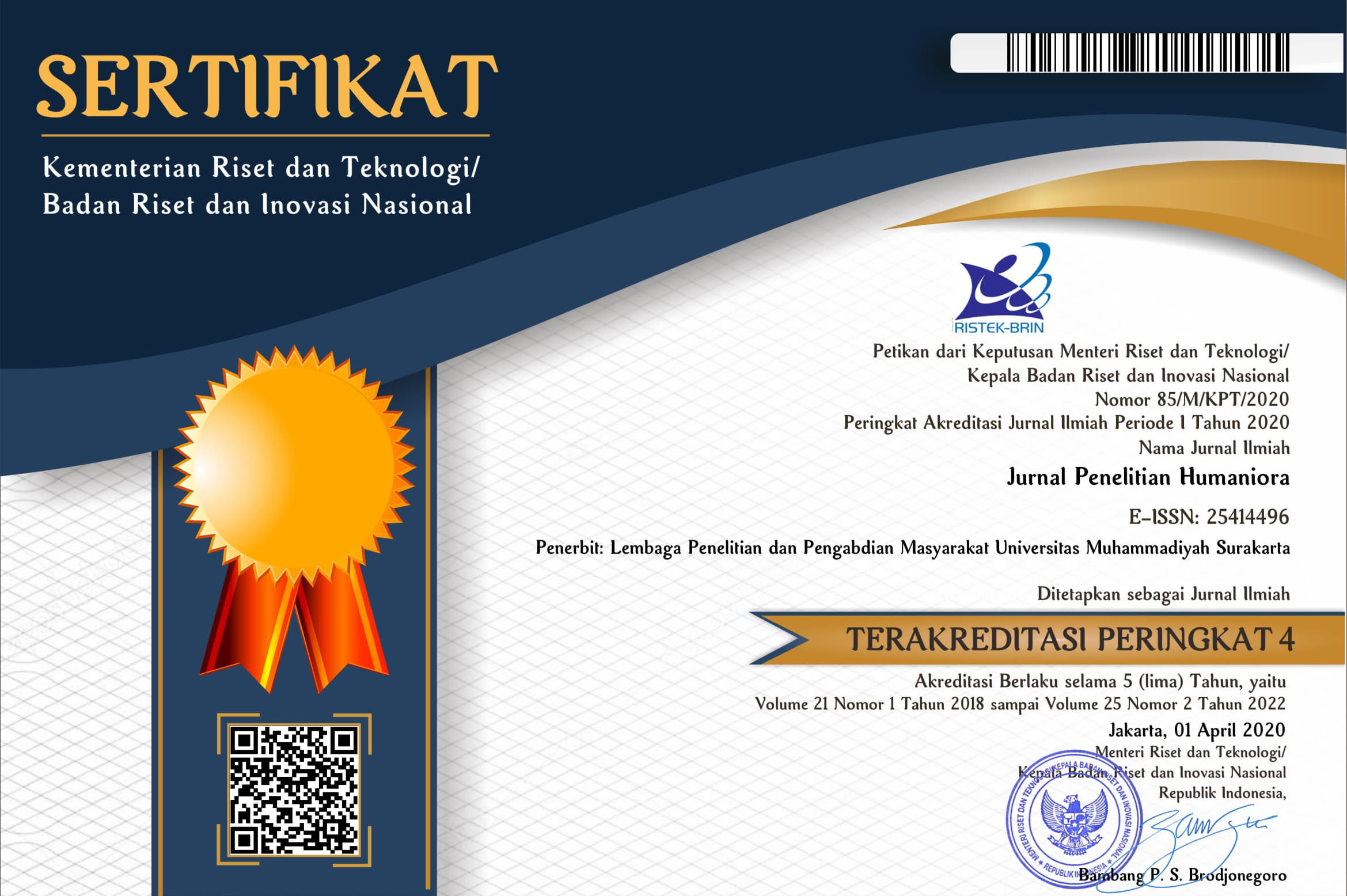RESISTENSI TOKOH AKU TERHADAP KOLONIALISME DI MUSIRAWAS DALAM NOVEL KEPUNAN KARYA BENNY ARNAS
Iit Purnama Asri(1*)(1) Universitas Airlangga
(*) Corresponding Author
Abstract
Keywords
Full Text:
PDFReferences
Arnas, B. (2016). Kepunan. Jakarta: Grasindo.
Bandel, K. (2013). Sastra Nasionalisme Pascakolonialitas. Yogyakarta: Pustaka Hariara.
Bhabha, H. K. (1994). The Location of Culture. London: Routledge.
Dermawan, R. N. dan Santoso, J. (2017). Mimikri dan resistensi pribumi terhadap kolonialisme dalam Novel Jejak Langkah karya Pramoedya Ananta Toer: tinjauan poskolonial. Jurnal Caraka, 4(1), 33—58.
Dewojati, C. (2017). Ambivalensi dan kuasa perempuan terjajah dalam Karina Adinda: lelakon komedie Hindia Timoer dalam tiga bagian. Jurnal Atavisme, 20(1), 1—13.
Efendi, A. N. (2016). Membaca resistensi terhadap kolonialisme dalam cerpen “Samin Kembar” karya Triyanto Triwikromo. Jurnal Pendidikan Bahasa dan Sastra. 16(2), 225—234.
Fajar, Y. (2015). Perlawanan terhadap penjajahan dalam puisi-puisi Indonesia dan Korea. Jurnal Atavisme,18(2), 183—193.
Fatimah, E. R. (2014). Nasionalisme dalam cerpen “Mardijker” karya Damhuri Muhammad: kajian poskolonialisme. Jurnal Poetika, II(2), 98—106.
Hafizh, M. Al. (2016). Rasisme dalam masyarakat pascakolonial: sebuah analisis wacana kritis terhadap novel-novel Jacqueline Woodson. Jurnal Humanus,. XV(2), 177—194.
King, R. (2001). Agama, orientalisme, dan poskolonialisme. Terj. Agung Prihantoro. Yogyakarta, Indonesia: Qalam.
Loomba, A. (2003). Kolonialisme/pascakolonialisme. Yogyakarta, Indonesia: Bentang Pustaka.
Moeis, A. (1928). Salah asuhan. Jakarta, Indonesia: Balai Pustaka.
Soekiman, D. (2000). Kebudayaan indis dan gaya hidup masyarakat pendukungnya di Jawa, abad XVIII-Medio abad XX. Yogyakarta, Indonesia: Yayasan Bentang Budaya.
Sutrisno, M. dan Putranto, H. (ed). (2004). Hermeneutika pascakolonial: soal identitas. Yogyakarta, Indonesia: Kanisius.
Wibisono, J. (2017). Rumah tusuk sate di Amsterdam Selatan.Yogyakarta, Indonesia: Oak.
Yasa, I. N. (2014). Postkolonial: teori dan penerapannya dalam sastra Indonesia mutakhir. Yogyakarta, Indonesia: Graha Ilmu.
Article Metrics
Abstract view(s): 1180 time(s)PDF: 1294 time(s)
Refbacks
- There are currently no refbacks.











